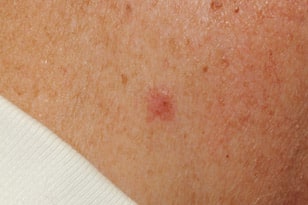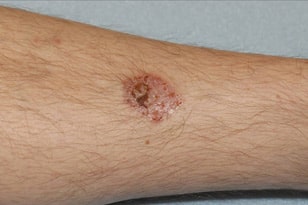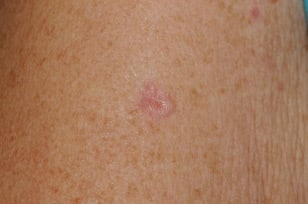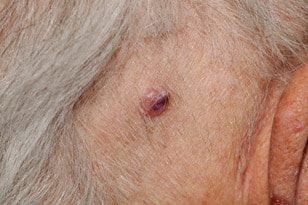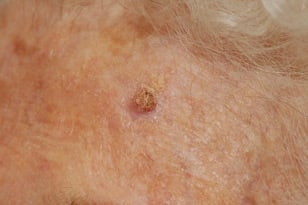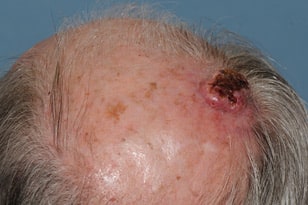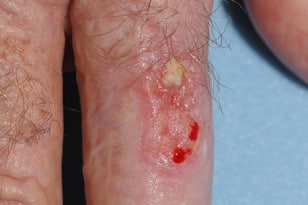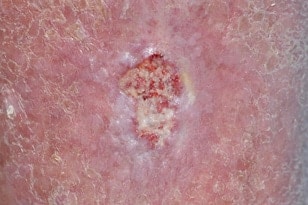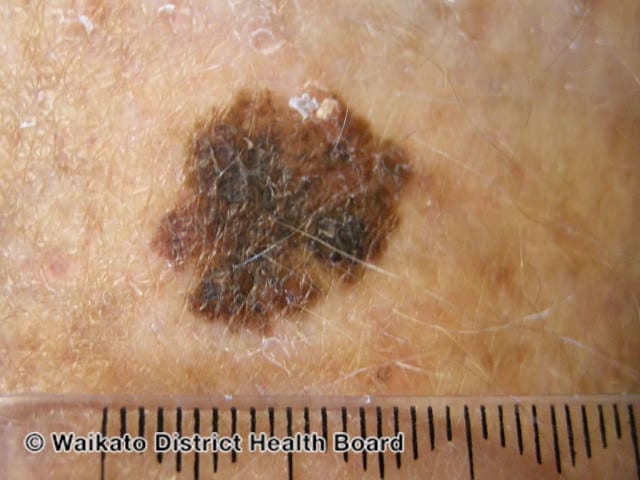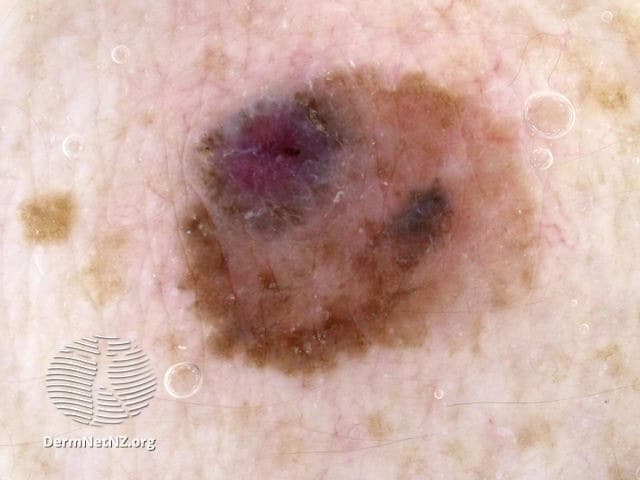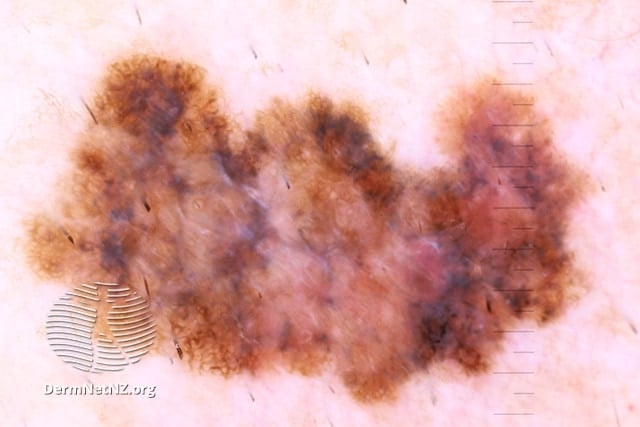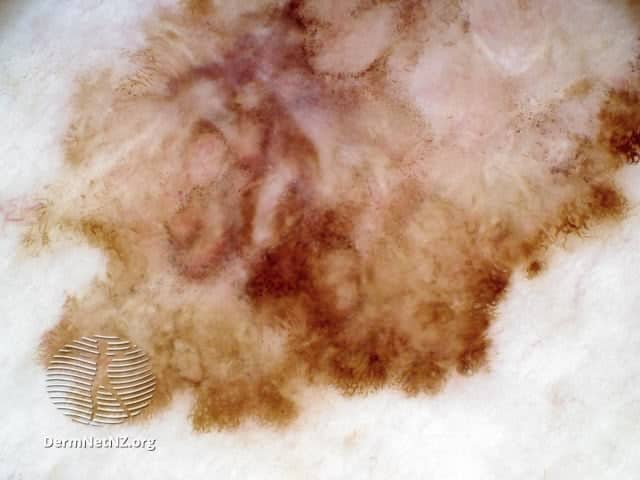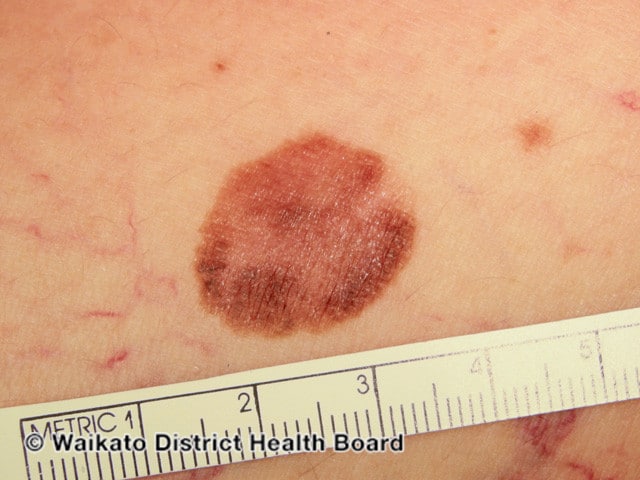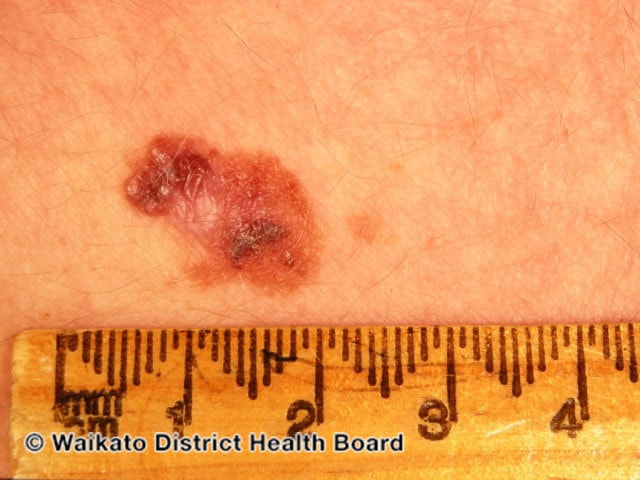Conditions and Causes
Skin cancer is linked to ultraviolet light exposure: the sun, sun lamps, tanning beds. If treated early, it is easier to treat and easier to beat.
It can be hard to detect a skin cancer by sight. Skin cancers have different characteristics. Even the same type of cancer can look different from person to person.
Watch for spots that:
- Grow rapidly
- Change shape, texture, or color
- Bleed or itch
- If you have any spots or growths that display these characteristics for two weeks, please see us immediately.
Basal Cell Carcinoma
Basal cell carcinoma is the most common form of skin cancer. When detected early and treated properly, the cure rate is close to 100 percent. Basal cell carcinoma (BCC) usually appears in areas that get a lot of sun exposure: the face, scalp, neck, hands, and arms. On occasion, it may appear on an area typically protected from the sun, such as the genitals. Although it grows slowly and rarely spreads to vital organs, basal cell carcinoma can cause significant disfigurement, and some forms can be deadly if left untreated.
Squamous Cell Carcinoma
Squamous cell carcinoma is a very common type of skin cancer. Treatment is almost 100 percent effective, if the cancer is detected and treated early. If left untreated, however, squamous cell carcinoma (SCC) can grow deeply, spread to other parts of the body, and become life threatening.
Squamous cell carcinoma is usually caused by tanning or sun exposure over a long period of time, but tobacco use, a burn, or exposure to radiation or strong chemicals can be responsible as well. Squamous cell carcinoma typically shows up on areas that get the most sun exposure — the ears, face, scalp, neck, or arms — but it can appear elsewhere, even inside the mouth or on the genitals.
Signs of a squamous cell carcinoma
- A thick, rough, scaly patch or wart-like bump that may crust or bleed
- A persistent open sore that itches and bleeds
- A scaly patch on the lip
Melanoma
Melanoma is a serious form of skin cancer. It is often treated successfully in the early stages, but when untreated, melanoma can spread to vital organs and be fatal. Melanoma is often triggered by intense, intermittent exposure to the sun. Melanoma may appear in an existing mole or look like a new mole.
High-risk individuals are:
- Fair-skinned people with light-colored hair and eyes
- People who have had sunburns or who burn easily
- People who have a personal or family history of skin cancer
- People who have numerous moles or who have atypical moles (dysplastic nevi) — moles that are large, unusually colored, and irregularly shaped
Signs of melanoma are:
- A mole that grows rapidly, changes shape, or changes color
- A mole that looks scaly, oozes, or bleeds
- A new spot that looks like a mole but grows quickly
- A spot of skin that is painful, itchy, or bleeding
- A brown or black streak underneath a fingernail or toenail
- A bruise on the foot that does not heal
Skin Cancer Treatment
We start by taking tissue samples (biopsies) of suspicious patches or growths and testing them. If cancer is confirmed, we will explain all of your options in-depth and help you decide on the best treatment plan.
Surgical Options
Surgical options for the three most common types of skin cancer include:
Mohs Micrographic Surgery
It involves removing thin layers of tissue — and testing each layer for cancer — until only healthy tissue remains. When your cancer is in an area that is more likely to have microscopic spread or is cosmetically sensitive, such as the face, this is the preferred treatment. Mohs surgery is also recommended for cancers that recur after a previous cancer treatment.
Surgical Excision
Using a scalpel, the doctor cuts out the growth and, as a safety measure, some surrounding tissue, then closes the incision with sutures. The tissue is then analyzed to make sure all cancerous cells have been removed.
Curettage and Electrosurgery
The doctor scrapes away cancer cells using a scoop-shaped surgical instrument called a curette. The site is then burned with electric current to destroy any remaining cells. The procedure is repeated several times to ensure that all cancer cells are eliminated.
Non-Surgical Options
While surgery is the gold standard of treatment, if you cannot undergo surgery, basal cell and squamous cell carcinoma can be treated with certain topical medications or, occasionally, radiation therapy.
Prevention and Monitoring
Once you have had skin cancer, you are always at risk for a recurrence. Responsible sun protection and early detection techniques should be a regular part of your daily life.
Skin Cancer Prevention Guide
Daytime
Stay out of the sun, especially between 10 a.m. and 4 p.m.
Annual cancer screening
Have us perform a professional, full-body skin cancer screening at least once a year. Make your appointment now.
Monthly self-exams
Examine your skin at least once a month. If you see a new, rapidly growing spot or a growth that is changing rapidly, itching, or bleeding for two weeks, call us immediately. Get a self-exam worksheet.
Dress Smart
Cover up with clothing, including a broad-brimmed hat and UV-blocking sunglasses.
Sunscreen
Apply broad spectrum (UVA/UVB) sunscreen with a SPF of 30 or higher to your entire body 30 minutes before going outside. For extended outdoor activity, use a water-resistant, broad spectrum sunscreen with a SPF of 30 or higher. Reapply every two hours or immediately after swimming or heavy sweating.
Tanning
Do not burn, tan, or use tanning booths.
Babies and Newborns
Keep newborns out of the sun. Use sunscreen on babies over the age of six months.
Learn More
- American Academy of Dermatology: Skin Cancer
- American Academy of Dermatology: Skin Cancer Diagnosis, Treatment, and Outcome
- American Academy of Dermatology: Skin Cancer Signs and Symptoms
- American Academy of Dermatology: Skin Cancer Causes
- Skin Cancer Foundation


